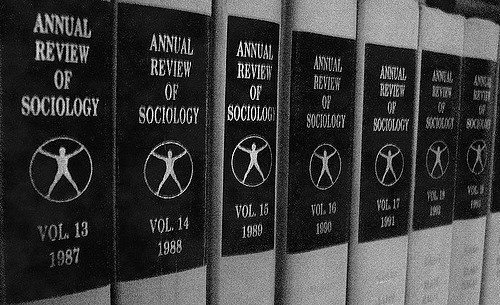
As discussed in a recent piece in The New York Times, economists have had an influential role in 20th century social and economic policy. Economics research has been instrumental in many policy decisions, from education to health care, and this continues today. As writer Neil Irwin suggests, however, other social science fields might also have the tools necessary to assist policymakers, and one of those disciplines could be sociology.
Some of the social forces and dynamics that economists study, such as wages and employment, can be understood more thoroughly when you also consider the sociological angle. Jobs are about more than paychecks for many people, acting as a source of identity and purpose. As sociologist Herbert Gans explains, “Unemployment isn’t just losing wages, it’s losing dignity and self-respect and a feeling of usefulness.” Research by Ofer Sharone shows that unemployed white-collar workers saw their inability to land a job as an indication of their self-worth. When they got rejected, they gave up more quickly. This phenomenon helps explain why the economy never fully recovered the jobs lost in 2008 — people didn’t feel confident about trying to find another job. Similarly, Jennifer M Silva finds that, for some young working class adults, past economic milestones such as buying a house or getting a job feel out of reach in today’s world, creating a sense of economic precariousness.
Another issue that sociologists can contribute to are poverty and housing. Sociologist Matthew Desmond’s book Evicted adds another layer to a discussion that has traditionally focused on subsidies, incentives, and lending. Evicted talks about how the cyclical struggle people in poverty face goes beyond dollars, and involved issues of stigma, discrimination, and unequal access to resources. These ideas may not normally be something policymakers focus on, especially when you consider that economists have been the primary go-to social scientists. But other fields could help add nuance to the conversation, which could lead to more comprehensive policy. Michele Lamont states that because of the influence that economics has, policymakers may find that “the only questions worth asking are the questions that economists are equipped to answer … That’s not to take anything away from what they do … It’s just that many of the answers they give are very partial.”

Comments 2
GiselleWillie — June 21, 2020
It is so interesting article, I interested in sociology and read about social issues from time to time. Today we should be aware, I guess, we can`t ignore the world and society. I Have also read the proves of your statement on https://samplius.com/free-essay-examples/social-issues/ this site`s posts when I was preparing my paper. There are so many informative and free essay examples, I recommend you to check it too.
Laura — August 21, 2020
Thanks for sharing this interesting article!